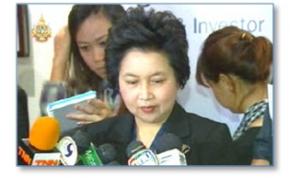ID :
198964
Wed, 08/03/2011 - 13:33
Auther :
Shortlink :
http://m.oananews.org//node/198964
The shortlink copeid
More investments in Thailand after July 3 election

BANGKOK, August 3 (TNA) - The Board of Investment of Thailand (BOI) revealed the investment climate in the country has improved following the recent July 3 election.
BOI secretary-general Atchaka Sibunruang explained that due to relieving political concerns, foreign investors from Asian countries namely Japan, Taiwan, South Korea and China, are turning to Thailand.
Atchaka said that in the first half of this year, applications for BOI investment privileges reached a total of 240 billion baht, exceeding the BOI’s January-June target of 200 billion baht. She added the number of applications from small and medium-sized enterprises also witnessed some eight-fold increase.
The BOI secretary-general forecast the figure would tip over the annual target of 400 billion baht by the year-end.
Nevertheless, she said the board would still closely monitor internal and external risk factors that may affect future investments, namely the growth of Thailand’s trade partners, the continuous baht appreciation, inflation rates, and the government’s 300-baht minimum wage policy. (TNA)
BOI secretary-general Atchaka Sibunruang explained that due to relieving political concerns, foreign investors from Asian countries namely Japan, Taiwan, South Korea and China, are turning to Thailand.
Atchaka said that in the first half of this year, applications for BOI investment privileges reached a total of 240 billion baht, exceeding the BOI’s January-June target of 200 billion baht. She added the number of applications from small and medium-sized enterprises also witnessed some eight-fold increase.
The BOI secretary-general forecast the figure would tip over the annual target of 400 billion baht by the year-end.
Nevertheless, she said the board would still closely monitor internal and external risk factors that may affect future investments, namely the growth of Thailand’s trade partners, the continuous baht appreciation, inflation rates, and the government’s 300-baht minimum wage policy. (TNA)





